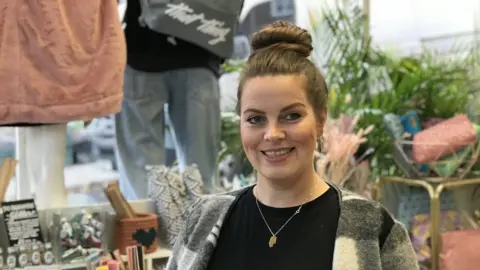The small shops in battle with the retail giants
 Maisie Sellick
Maisie SellickWhen Boris Johnson came on television to announce the November lockdown, it was the final straw for Joh Rindom.
Before the prime minister had even finished speaking, the shop owner from Bristol had hammered out her response on Instagram.
"Small businesses will once again suffer immeasurably," she told her customers.
"So PLEASE shop small," she added. "Resist Amazon at all costs, and think about how you 'vote with your money'."
Joh runs That Thing, an independent fashion, homeware and accessories shop. Like many smaller retailers she's just been through the hardest year she's ever known.

It is always hard to compete with the big online brands but this year, shop-owners like her have had to stand by as rival outlets - deemed essential - remain open, scooping up Christmas trade.
By the end of November non-essential shops will have been closed for 17 weeks of the year. Some say it's a "use it or lose it" situation: shoppers need to support them or next Christmas they won't be there.
"Small businesses have websites too," says Joh. "People just need to wake up a bit and think outside that box."
Perhaps because people have spent more time at home, perhaps because they've focused on what is important to them, this year there does seem to be a "fashion for independents", she thinks.
A third of us plan to spend more at independent stores this year than we did in 2019, according to a poll commissioned by Enterprise Nation, an organisation which supports start-ups. It found younger shoppers are even more determined, with half of under-35s planning to shop more at independents.
Small scale sellers have been quick to respond to these pledges, offering everything from vintage handbags to macrame plant hangers. There are more than 42 million posts tagged #shoplocal on Instagram.
Larger independents are showing their agility too. Those who weren't already trading online have been quick to remedy that, and while their budgets make it hard to compete with the likes of John Lewis and Marks and Spencer, they're finding ways to gain traction: reaching out to local online community groups, tapping into nostalgia with "Hovis-ad style" bicycle deliveries, and emphasising their environmental credentials.
Others are innovating even more: chatting one-to-one with customers on video calls and offering personal shopping over Zoom.
Loki Wine Merchants in Birmingham has held virtual wine tastings, and DJV Boutique in Ipswich launched online fashion shows and a service that helps select, wrap and send your gifts for you.
DJV's owner Mandy Errington says loyal customers are keen to support them but it doesn't stop there. "We're attracting new people because of the personal services," she says.
 Anglia Picture Agency
Anglia Picture AgencyBut independents know that still won't be enough to get them noticed in the run up to Christmas, so some are joining forces.
In Bristol Joh Rindom has banded together with 22 other independent outlets to create an online directory. They are putting posters up around the city advertising "Bristol Independents Online" with a QR code linking to their website.
 Maya Maya
Maya MayaChristmas markets, which usually see the streets of many UK towns and cities crammed with shoppers elbow-to-elbow, have inevitably been cancelled. But many of those are being replaced with virtual forums, offering the chance to buy direct from the people who would usually run stalls.
More permanently, Bookshop.org has recently launched in the UK. Marketing themselves as an "ethical" way to fight the might of Amazon, it's hosting online shopfronts for more than 250 of the UK's independent booksellers, offering them a large slice of any sales revenue they help generate.
For its part, Amazon points out it is not the enemy to small businesses that it is sometimes painted. More than half of the physical products sold on Amazon come from small and medium-sized third party businesses, it says.
In October it held a small business promotion to drive business their way and it runs bootcamps and online learning sessions to support small sellers in conjunction with Enterprise Nation.
Emma Jones, the founder of Enterprise Nation, says Amazon and similar forums can help to build a "broad exposure to customers".
"Yes, have your own e-commerce website and social channels, but it also makes sense to try out selling on Amazon, Etsy or Uber Eats for restaurants and caterers, as they offer access to a vast customer network," she says.
 Getty Images
Getty ImagesLavinia Davolio, founder of confectionery boutique Lavolio in London, says before Covid-19 hit around half of her sales were online, the majority of them through Amazon. But this year those sales have doubled. Amazon has been "a lifesaver" she says.
So will these strategies be enough to see local retailers through?
Oliver Vernon-Harcourt, a partner in Deloitte's retail consulting practice, says strategies like these - building networks, innovating with digital technology, reaching out to new customers - could make all the difference.
"The businesses that are proactive about trying different things - testing, learning, failing as quickly as possible - they're the ones who have the best chance of thriving," he says. What's more they'll then be in a stronger position to compete in future years.
But in the end, says Andrew Goodacre from the British Independent Retailers Association, it will come down to consumers. Will they put their money where their mouths are?
"It will only be enough if people don't panic and buy everything [for Christmas] now," he says.
"There are two things I'd urge consumers to do: wait until December, you'll have better choice and better value. And if you are shopping online, look for the shop you know, not the product you want."